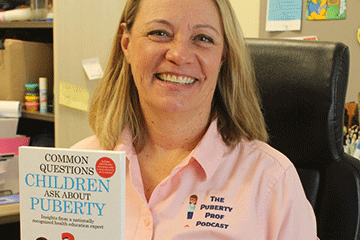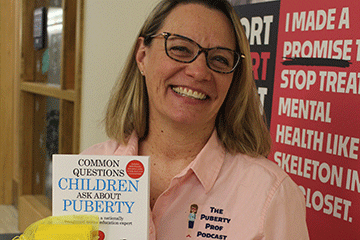
02/07/2023
As children grow into adolescents, families are often uncertain about how to approach a host of new issues ranging from first crushes to body hair. Many are uncomfortable talking about the topics.
Those families might want to consult The Puberty Prof.
That’s both the online persona and popular international podcast of Lori Reichel, an assistant professor in SUNY Cortland’s Health Department who has made the often awkward and difficult transition from child to adult her specialty.
Launched in January 2021, the Puberty Prof podcast has shared 92 episodes to date and was recently picked up by a marketing representative for content producers.
On the show, Reichel has hosted a diverse list of national experts on a range of topics, including useful tips in having puberty talks, acne and pimples, body image and self-love, spirituality and sexuality, gender inclusive puberty, pregnancy, keeping kids safe from online sexual content, kid-friendly ways to talk about interpersonal violence and empathy.
“It was always amazing to me how uncomfortable parents were in talking to their kids about puberty: body hair, menstrual cycles, wet dreams and that kind of stuff,” said Reichel, who is in her first year at Cortland.
Before she became The Puberty Prof, Reichel spent 20 years teaching and administrating health education to schoolchildren on Long Island. The experience made clear the importance of effective and healthy communication with both children and their parents or caregivers.
For example, while working on her doctoral dissertation at Texas A&M University in the early 2010s, Reichel discovered an online study that had asked 1,000 mothers of toddlers what words they used to name body parts to their offspring.
“And there were over 80 terms for male parts and over 90 something for female parts,” she said. “When I saw that study, I thought, ‘Oh, we start barriers in communication right away if we can’t even call the vulva the vulva; if we have to use words like “pussy cat” or “butterfly” or whatever else. We are already telling young people that we don’t feel comfortable talking about the body parts.’”
Named the 2010 American Association of Health Education Professional of the Year and the 2007 New York State Health Educator of the Year, she taught at Western Michigan University for several years before joining SUNY Cortland in 2022. From 2013 until 2019, she was a faculty member at University of Wisconsin-La Crosse.
According to Reichel, the reality is that America’s schools in general are not always supportive of giving children an adequate education about sexuality, leaving many young people ignorant, scared and vulnerable. That’s where parental preparation comes in.
Reichel is fast becoming a frequent speaker and media consultant in her area of expertise, including Reframing Out Stories, Mom Essentials, and the Stand Up Comedy Sex Ed Podcast.
Her three-year-old program recently was picked up by Digitent, a marketing representative for content producers, podcasters and storytellers that promises to give Reichel the tools to expand her as-yet-limited audience.
Reichel is the author of the book for parents and caregivers, Common Questions Children Ask About Puberty, and a manual for educators, Comprehensive School Health Education. She also developed a low-cost game called “Talk: Apps and Discussion Cards,” an ice breaker on awkward or sensitive topics.

Reichel’s ambitious aim through her digital outreach is to earn the trust to help parents and caregivers effectively communicate with their children at an age-appropriate level. Reichel wants to reach every family in America in need of her free educational podcast.
“In the past, I’ve done things more for K-12 students and teachers,” Reichel said. “So, I’m very skilled about how to talk with people, how to not be in their face talking about sexuality. I’m more of the gentle ‘have you considered this or considered that?’ approach. I’m also about life skill-based health education.”
“What are effective communication skills, decision-making skills, skills at accessing resources? That’s what I was teaching in the K-12 world: How to make the best decision leading to prevention, how to communicate with your sexual partner, and if something goes wrong, how to go about addressing it.
“Now I’m trying to back up a little bit,” Reichel said. “In this third series, we’ll talk about life skills, for example, how do we talk about decision-making because that’s a social, real live thing. When young people are going through puberty, they are becoming more independent. So, we want to make sure they have that more reflective part. Topics may include things like ‘how do I handle body smells?’ Or ‘How to I handle my friend who’s pressuring me to vape?’
“There’s no research to show that if we talk honestly about these topics, it increases their likelihood of engaging in sex,” Reichel said.
“Actually, the research shows that if parents and other caregivers talk about these topics and they even express their values, young people are more likely to delay sexual activity. Or if they engage in sexual activity, they are more likely to use protection and more likely to prevent STDs (sexually transmitted diseases). So that’s why we encourage the conversation.”
The name Puberty Prof sounds catchy but doesn’t really encompass the broad range of issues raised by the maturing young human body, Reichel admitted.
“Puberty is these physical changes, so I really should be called The Adolescence Prof, because adolescence covers the physical, social, mental, emotional, and spiritual aspects, it covers all of that,” Reichel admitted. “But that name really doesn’t have the same flow.”
Reichel is not out to make money off her service. For now, she pays the small fees to maintain her podcast out of her own pocket and manages a website called “Helping Families and Schools Become Healthier.”
“Some people just don’t have the resources to take a class,” she said. “Some health classes might be available for $50 for you and your child to attend. But some people barely have money to put food on the table. They have a right to an education.
“Recently I was asked to do classes, with the first two offered for free,” she said. “Yet I don’t want people to have to pay for this. I’m very blessed that I have a fulltime position. So, this is part of my service and scholarship. Why can’t I do this for society?”
Reichel can be contacted about puberty questions or comments at [email protected] and for a consultation at [email protected]. She can also be reached at [email protected].